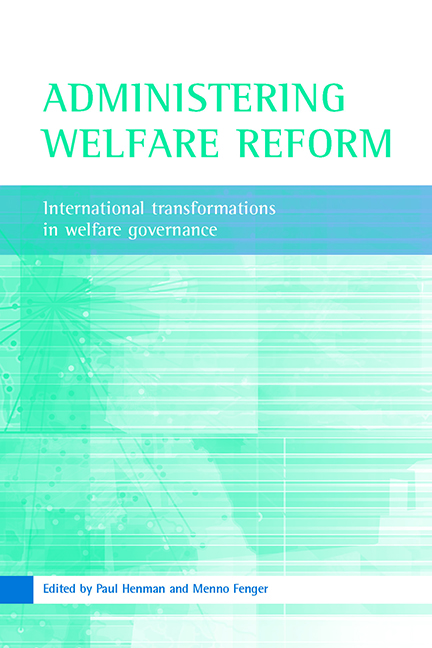Book contents
- Frontmatter
- Contents
- List of tables
- Preface
- Acknowledgements
- List of abbreviations
- Notes on contributors
- one Introduction: administering welfare reform
- two Welfare reform as governance reform: the prospects of a governmentality perspective
- Part One Participants: reforming the agents of welfare delivery
- Part Two Practices: the welfare governance of street-level practices
- Part Three Processes: the changing spaces of welfare governance
- Index
- Also available from The Policy Press
Preface
Published online by Cambridge University Press: 14 January 2022
- Frontmatter
- Contents
- List of tables
- Preface
- Acknowledgements
- List of abbreviations
- Notes on contributors
- one Introduction: administering welfare reform
- two Welfare reform as governance reform: the prospects of a governmentality perspective
- Part One Participants: reforming the agents of welfare delivery
- Part Two Practices: the welfare governance of street-level practices
- Part Three Processes: the changing spaces of welfare governance
- Index
- Also available from The Policy Press
Summary
Just as major social and economic changes – the effects of market liberalism in the late 19th century, the 1930s’ Depression and the two World Wars – precipitated the development and expansion of the welfare state project, the 1970s’ oil crisis and the consequent project of economic readjustment has led to an ongoing programme of reforming welfare policy. Since the mid-1980s, activation and workfare policies have featured particularly heavily in the policy transformations that have occurred in advanced welfare states. Such policies have been widely studied both at national and international levels. Comparative social policy has concurrently grown in these last few decades and has stimulated many new insights about the various manifestations of social protection and their ongoing transformations.
Despite this intense research interest in analysing, evaluating and theorising welfare reform, the domain of the implementation and administration of welfare policy has received somewhat less research attention. This, however, is changing. This book represents a fourfold effort: to understand the transformations in welfare administration concomitant to welfare reform; to identify the particular effects of public sector reform in the nature of welfare state provision; to provide some international comparative data on such transformations; and to draw greater attention to the importance of welfare administration in providing a deeper understanding of its role in the nature, practices and effects of the welfare state.
This book draws on our long-standing interests in welfare governance. Paul Henman has been particularly interested in the role of technology in shaping the nature and substance of both welfare administration and welfare policy, whereas Menno Fenger's research focuses on processes of long-term policy change in the field of social policies.
This book has its origin in two themed sessions on ‘Welfare reform in international perspective’ held at the ‘International Sociological Congress 2002’ in Brisbane, Australia organised by Paul Henman. Many of the papers presented at this conference examined the issues of welfare administration, which was then, and still remains, an under-examined topic. It was at this conference that we met and together determined the need to provide a concentrated outlet for such innovative work. In addition to some of the papers presented at the conference, new works were commissioned that fitted in the framework we had developed for this book. We are very pleased with the collection assembled in your hands for its breadth and depth. But we are also very aware of the book's limitations.
- Type
- Chapter
- Information
- Administering Welfare ReformInternational Transformations in Welfare Governance, pp. vi - viiPublisher: Bristol University PressPrint publication year: 2006

